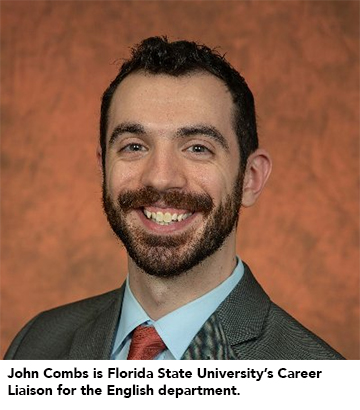Department of English Career Liaison John Combs and English alumna Kiersten Maxwell dispel stereotypes about the major
By Sophia Lazo
A common stereotype of English majors is that they only want careers as teachers, writers, or in the publishing industry.
That’s not the reality.
Still, the categorizing is so common that people may not be aware of the actual possibilities available, and people tend to place English graduates inside a box that limits what they can accomplish in the future.
John Combs, Florida State University’s Career Liaison for the English department, says now is time to break this stereotype.

“The main thing that I see with the English major are the skills and the skill development that come from it,” Combs says. “There’s being able to communicate effectively, written communication, oral communication, research, reading, critical thinking skills, and other things like organization and time management.”
Those abilities help English majors succeed in many careers: “Whenever there are words involved, English majors can be of use,” he adds.
His observations highlight how studying English can open doors to different areas of expertise. He adds that the major’s flexibility is appealing as well. Combs, who meets in person with students Tuesdays and Thursdays in the Williams Building, helps guide students in picking a career path that best fits their interests.
Combs’ background is in music, and he earned his bachelor's degree in piano from the University of Louisville and his master's degree in collaborative piano from the University of Cincinnati College-Conservatory of Music. He is currently in the Music Theory doctoral program at FSU’s College of Music.
When Combs thought of his future and where he wanted to end up, he realized his passion interest in higher education and helping students. He saw a job posting for the Career Center and started working there in January of 2022.
Combs has been working with the English department since the beginning of the Fall 2022 semester, and he has seen how the skills students acquire while studying English can be applied to many different careers.
For example, students who have an interest in technology can go into the field of information technology. Students who want to help others may go into healthcare or social services. Critical thinkers may choose to study law. If their interest lies in negotiations and contracts, they can go into business development.
In a July 31, 2019, article for The Chronicle of Higher Education, senior writer Goldie Blumenstyk discusses how English majors have so many options for their careers. Her main reason is simple: the skills they learn. She references a study done by EMSI, a labor-market analytics company.
 “EMSI’s analysis found that the very skills held by those who had majored in English—or philosophy or social sciences or business or communications—seemed to have prepared them well for jobs in fields like sales, marketing, training, and management, which are all now in high demand,” Blumenstyk writes in the article titled “Relax, English Majors. You’re Still Plenty Employable.”
“EMSI’s analysis found that the very skills held by those who had majored in English—or philosophy or social sciences or business or communications—seemed to have prepared them well for jobs in fields like sales, marketing, training, and management, which are all now in high demand,” Blumenstyk writes in the article titled “Relax, English Majors. You’re Still Plenty Employable.”
Kiersten Maxwell is a recent FSU graduate who discovered the truth of that statement. She graduated summa cum laude in the spring of 2022 with dual majors in English-Editing, Writing, and Media and in Risk Management.
While a student at FSU, she was involved in multiple clubs and organizations, such as Dance Marathon and Panhellenic. She thinks her involvement in various campus extracurriculars also helped her land her current job.
Maxwell currently works as an Acquisition and Lender Compliance Associate in the insurance department of Franklin Street, a commercial real estate and insurance brokerage firm in Tampa, Florida. She explains how her English background comes into play in simple terms: “Transferrable skills.”
“Every interviewer I talked to was practically drooling over the fact that I was an English major,” Maxwell says. “It’s especially helpful when I have to communicate between different parties where not everyone speaks the same ‘insurance language.’ The ability to be well-spoken—and able to make bad news sound less bad—is invaluable.”
As Combs points out, Maxwell is applying the skills she learned while pursuing an English degree in not so traditional ways, while working to disprove certain stereotypes about English majors.
“There is a wider variety of fields that are not just publishing and editing that English majors can be a part of,” Combs says. “They can do anything they want. The sky is the limit.”
Through Kiersten and many other FSU English graduates, it is clear that the set career path for an English major is not as definitive as it is maybe once was or is made out to be. English majors who are unsure about what they want to do for a career do not need to be stressed, according to current trends. Many opportunities are available—even in teaching, writing, and publishing, if that’s the route they want to take.
FSU resources such as English department advisors and the Career Center—specifically Combs—are always willing to help students discover ones that might not be obvious.
Sophia Lazo is an English major, on the editing, writing, and media track, with a minor in political science.
Follow the English department on Instagram @fsuenglish; on Facebook facebook.com/fsuenglishdepartment/; and Twitter, @fsu_englishdept

